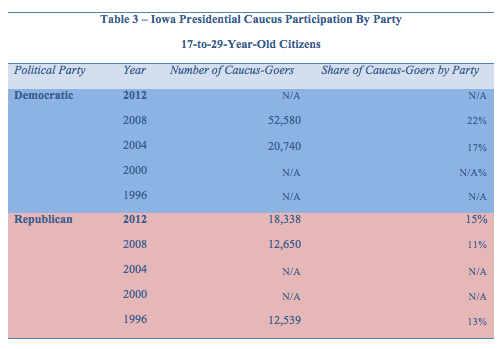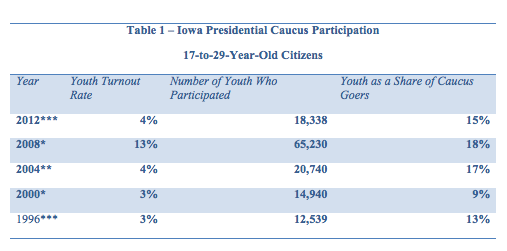Iowa Caucus Youth Turnout: 4%, Overwhelmingly Supported Paul, Provided Candidate 1/3 of Total Votes
About 18,000 Iowans Under the Age of 30 Participated in Last Night’s Caucuses
MEDFORD/SOMERVILLE, Mass. – Four percent of eligible Iowa voters under the age of 30 participated in last night’s presidential caucuses, according to preliminary analysis by The Center for Information & Research on Civic Learning & Engagement (CIRCLE). Representative Ron Paul (R-TX) drew the support of 48% of the under-30 caucus-goers, with Rick Santorum coming in second among young people with 23%; Mitt Romney drew just 14% of the young voters (see Table 2).
According to CIRCLE’s estimate, approximately 8,800 young people turned out for Ron Paul in last night’s caucus. In comparison, at least 30,000 young people turned out for Barack Obama in the 2008 Iowa Caucuses, contributing to his victory there. Almost twice as many young voters supported Obama in 2008 as supported all the 2012 Republican candidates combined. The 48% support for Rep. Paul was the highest level of support for any candidate among any age group in yesterday’s Caucuses. (Mitt Romney won 33% of the votes of ages 65 and older, the second strongest concentration of support.) Youth represented a typical proportion of all the Iowa Caucus-goers in 2012 at 15%.
“For the second election in a row, youth played an important role in the Iowa Caucuses,” said CIRCLE Director Peter Levine. “In 2008, they turned out strong and gave their support to both parties’ Iowa Caucus winners, Barack Obama and Mike Huckabee. In 2012, they turned out at a more typical rate but threw such a high proportion of their votes to Ron Paul that he finished close. It is statistically unlikely that the young Paul supporters of 2012 had caucused for Obama in 2008. It is more likely that a different group was mobilized in each year.”
Because of lack of available data, the CIRCLE turnout estimates do not include young people who participated in yesterday’s uncontested Democratic Caucuses.
The 2012 youth turnout was the same as in 2004 (the last year in which only one party had a competitive race). In the two recent years that had both Republican and Democratic competitive races, the youth turnout was 13% in 2008 and 3% in 2000. See Table 1 below.
**2004 statistics only include the Democratic Caucus. There was no Republican Caucus in 2004, because President George W. Bush was an incumbent and the GOP nomination.
***2012 and 1996 statistics only include the Republican Caucus. In these years, there was/is no Democratic Caucus, because there was an incumbent president from the Democratic Party that took the nomination.
Source: The share of Caucus participants is obtained from the 2012, 2008, and 2004 IA entrance poll conducted by Edison Research, and the 2000 and 1996 IA entrance poll conducted by Voter News Services. The numbers of votes cast are obtained from the Associated Press at 6:20 am Eastern Time on January 4, The numbers of votes cast in the past election years were obtained from various sources including the Washington Post archives (1996), Federal Election Commission (2000 and 2004), and CNN.com (2008). Estimated voter turnout is obtained by taking the estimated number of votes cast by young people and dividing it by the estimated population of the 17-to-29-year-old citizens from the Current Population Survey (1995-2011). See p. 2 for definitions.
Comparisons to past years must be made with caution, because turnout is affected by the date of the caucuses and by the nature of the Democratic and Republican presidential campaigns, which are different in every cycle. For example, in 2008 both the Republicans and Democrats held caucuses, but in 2012 only the Republicans held a competitive caucus. Table 3 provides estimates of youth participation in Iowa caucuses by party and year.

Definitions
- Youth: For the purpose of this press release and estimation of youth participation in the Iowa Caucus, we define “youth” as citizens who were eligible to vote on January 3, 2012, as permitted by state election law.
- Number of youth who participated: An estimate of how many youth participated in caucuses or primaries.
- Youth share: An estimate of the number of young people who participated in the caucus as a percentage of the number of all people who participated.
- Youth turnout rate: An estimate of the number of young people who participated in caucuses or cast ballots as a percentage of the total number of young people who were eligible to participate on January 3, 2012.
The youth turnout rate is the best indicator of how young Americans are engaging in the political process. The other statistics—the sheer number of youth participants and the youth share of the electorate—can change because of factors unrelated to youth engagement.
To sign-up to receive copies of CIRCLE’s cutting-edge research on young Americans and next-day voter turnout estimates for the 2012 elections, please email amy@lunamediagroup.com.
###
CIRCLE (www.civicyouth.org) is a nonpartisan, independent, academic research center that studies young people in politics and presents detailed data on young voters in all 50 states. CIRCLE was founded in 2001 with a generous gift from the Pew Charitable Trusts and is part of the Jonathan M. Tisch College of Citizenship and Public Service at Tufts University. CIRCLE’s reputation for reliable, independent, timely research has been hailed by experts in the field of civic partnership, such as Harvard University professor Robert Putnam who said CIRCLE had brought “the best and most serious research to one place.”
The Jonathan M. Tisch College of Citizenship and Public Service (http://activecitizen.tufts.edu/ ) is a national leader whose model and research are setting the standard for higher education’s role in civic engagement education. Serving every school of Tufts University, Tisch College creates an enduring culture that prepares students to be lifelong active citizens.
Tufts University (www.tufts.edu ), located on three Massachusetts campuses in Boston, Medford/Somerville and Grafton, and in Talloires, France, is recognized as one of the premier research universities in the United States. Tufts enjoys a global reputation for academic excellence and for the preparation of students as leaders in a wide range of professions. A growing number of innovative teaching and research initiatives span all Tufts campuses, and collaboration among the faculty and students in the undergraduate, graduate, and professional programs across the university’s schools is widely encouraged.








January 4th, 2012 at 10:43 am
[…] of 30 who participated in the GOP Caucuses last night, Paul earned the support of 48%, according to data collected by CIRCLE. Rick Santorum came in second with 23%, while Romney gathered just 14% […]
January 4th, 2012 at 1:16 pm
[…] of 30 who participated in the GOP Caucuses last night, Paul earned the support of 48%, according to data collected by CIRCLE. Rick Santorum came in second with 23%, while Romney gathered just 14% […]
January 4th, 2012 at 1:29 pm
[…] of 30 who participated in the GOP Caucuses last night, Paul earned the support of 48%, according to data collected by CIRCLE. Rick Santorum came in second with 23%, while Romney gathered just 13% […]
January 4th, 2012 at 1:30 pm
[…] 30 who participated in the GOP Caucuses last night, Paul earned the support of 48%, according to data collected by CIRCLE. Rick Santorum came in second with 23%, while Romney gathered just 13% […]
January 4th, 2012 at 5:04 pm
[…] 30 who participated in the GOP Caucuses last night, Paul earned the support of 48%, according to data collected by CIRCLE. Rick Santorum came in second with 23%, while Romney gathered just 13% […]
January 4th, 2012 at 5:04 pm
[…] CIRCLE looks at youth turnout at the Caucus […]
January 4th, 2012 at 5:22 pm
[…] to a Center for Information and Research on Civic Learning and Engagement, 4 percent of all authorised Iowa electorate underneath a age of 30 took partial in Tuesday’s […]
January 4th, 2012 at 6:20 pm
[…] 30 who participated in the GOP Caucuses last night, Paul earned the support of 48%, according to data collected by CIRCLE. Rick Santorum came in second with 23%, while Romney gathered just 13% […]
January 4th, 2012 at 6:41 pm
[…] to the Center for Information and Research on Civic Learning and Engagement, four percent of all eligible Iowa voters under the age of 30 took part in Tuesday’s […]
January 4th, 2012 at 9:03 pm
[…] to the Center for Information and Research on Civic Learning and Engagement, four percent of all eligible Iowa voters under the age of 30 took part in Tuesday’s […]
January 4th, 2012 at 10:30 pm
[…] 30 who participated in the GOP Caucuses last night, Paul earned the support of 48%, according to data collected by CIRCLE. Rick Santorum came in second with 23%, while Romney gathered just 13% […]
January 5th, 2012 at 2:34 am
[…] to data from the Center for Information and Research on Civil Learning and Engagement (CIRCLE), of the 18,000 Iowans under the age of 30 who showed up at the caucuses on Tuesday night, […]
January 5th, 2012 at 5:50 am
[…] to the Center for Information and Research on Civic Learning and Engagement, four percent of all eligible Iowa voters under the age of 30 took part in Tuesday’s […]
January 5th, 2012 at 7:01 am
[…] to the Center for Information and Research on Civic Learning and Engagement, four percent of all eligible Iowa voters under the age of 30 took part in Tuesday’s […]
January 5th, 2012 at 8:48 am
[…] to a Center for Information and Research on Civic Learning and Engagement, 4 percent of all authorised Iowa electorate underneath a age of 30 took partial in Tuesday’s […]
January 6th, 2012 at 10:12 am
[…] of 30 who participated in the GOP Caucuses last night, Paul earned the support of 48%, according to data collected by CIRCLE. Rick Santorum came in second with 23%, while Romney gathered just 13% […]
January 11th, 2012 at 1:53 pm
[…] Of the Republican Iowa caucus goers under the age of 30, 48 percent supported Ron Paul. 23 percent went for Rick Santorum, and 14 percent favored Mitt Romney. (CIRCLE) […]
January 12th, 2012 at 10:45 am
[…] last week’s Iowa caucuses, turnout among young voters (below age 30) was a meager 4%. But although that number was really low, you have to remember it is a caucus – you have to […]
January 12th, 2012 at 12:20 pm
[…] results in New Hampshire dovetail with those out of Iowa, where Paul earned the support of 48 percent of the 18,000 Iowans under the age of 30 who […]
January 14th, 2012 at 4:53 am
[…] results in New Hampshire dovetail with those out of Iowa, where Paul earned the support of 48 percent of the 18,000 Iowans under the age of 30 who […]
February 8th, 2012 at 9:56 am
[…] towards a purer, more ideological libertarianism rather than the standard Republican platform. He dominated the youth vote in Iowa, of which he received nearly 50% support, and statistical analysis suggests that he’s actually […]
February 11th, 2012 at 5:39 pm
Stay focused…
[…]CIRCLE » Iowa Caucus Youth Turnout: 4%, Overwhelmingly Supported Paul, Provided Candidate 1/3 of Total Votes[…]…